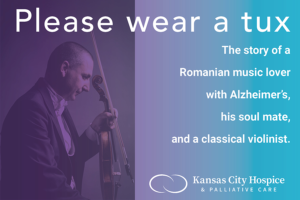 Guest blog by Marie Marley, Volunteer at Kansas City Hospice & Palliative Care
Guest blog by Marie Marley, Volunteer at Kansas City Hospice & Palliative Care
“Please wear a tux,” I said over the phone to Don, the classical violinist I was hiring to play a special concert for my Romanian soul mate, Ed, who had Alzheimer’s and was receiving hospice care. Ed was a resident in a memory care facility, and it was to be a concert just for Ed in his room there. I described Ed’s dementia to Don, adding that he had been a college professor who loved classical ‘moo-sic.’
I was extremely nervous about the whole plan, worrying that Ed might be in a bad mood and tell Don to leave. After fretting about it for a few days, I decided to take the chance and go ahead despite my reservations. The concert would either bring Ed great joy or be a total disaster. That was just the way it was when you were dealing with a person with dementia.
When I arrived at Ed’s room on the day of the concert, I was relieved to see the aide had him shaved and nicely dressed in a light blue shirt and his grey tweed sport coat, the one with leather patches on the elbows. Believe it or not, it was the same sport coat he was wearing the day I met him almost 30 years earlier.
At the appointed time I went down to the lobby to meet Don. I introduced myself and then we walked toward Ed’s room. I was about to learn how Ed was going to receive Don. Our entrance startled Ed and he jerked to attention. I introduced them and told Ed that Don was going to play a special violin concert for him.
“Oh. Superb! Wonderful! I’m honored!” Ed said as he shook Don’s hand.
I had the feeling Ed was really impressed by the tux.
So Ed was honored and I was relieved. I set up my tripod and fastened my camera to it. I planned to take many pictures, hoping to get at least a few good shots of what I hoped was going to be a special occasion. The longer Ed was at the Alois Center, the more I felt photographs would be important to me later.
Don sat down on the tan metal folding chair I’d placed in front of Ed. He scooted the chair even closer, only about three feet from Ed, and began playing a Strauss waltz. The sounds were lively and luscious. I watched as his bow flew up and down, his fingers danced around, and his head snapped back on the high notes. Ed looked captivated. His eyes glued to Don, he had a rapt expression on his face and moved in time with the music.
“Bravo! Bravo!” he boomed in his deep bass voice while clapping at the end of the waltz. “That was the most beautiful ‘moo-sic’ I have heard ever in my entire, very long, and I emphasize very long life!”
Don thanked him and began playing a Romanian piece, as I’d previously requested. It was a Rhapsody by Enesco. Ed smiled broadly but I couldn’t tell if he realized it was music from his homeland.
“Bravo! Bravo!” he called out again, clapping as before. “That was the most beautiful ‘moo-sic’ I’ve heard,” he said. “Ever,” he added. “I don’t have words to say how happy I am that you are playing just for me.” “Thanks,” Don said. “I’m glad you liked it.”
“My father played the violin,” Ed said, “but not nearly as well as you.” Ed reached his hand toward Don and Don grasped and held it.
“What did you teach when you were a professor?” Don asked.
“I don’t r-r-remember,” Ed answered. Then he added, “Honestly, I’m not even sure I was a professor.”
Then since there were so many Gypsies in Romania and that was part of Ed’s culture, I asked Don to play some Gypsy music. He played Bizet’s Habañera from Carmen, and Ed sang along, jabbing his index finger in the air in time with the music. “Tra la la-la, la la la la-la,” he sang, a big smile on his face and a twinkle in his eyes.
“Bravo! Bravo!” he shouted when Don finished. “That was the most beautiful ‘moo-sic’ I have heard ever in my entire very long, and I emphasize very long life,” he said for the third time. “You are the most talented ‘moo-si-cian’ I have ever heard, and I r-r-really mean it from my heart – it’s not just words from my lips.”
Don played half an hour longer, the music interspersed with more hand holding and small talk. When the concert was finished, I asked Don to sit on the sofa beside Ed so I could take a picture of them. Ed put his hand on Don’s arm and I snapped the photo. After that Don tried to rise to leave but he had trouble because Ed wouldn’t turn loose of his arm. Finally, Don extricated himself. “When are you coming back?” Ed asked.
Since Don didn’t know to say ‘tomorrow,’ I jumped in. I always said I’d come back ‘tomorrow’ because it made Ed happy and I knew he’d never know the difference. “He’s coming back tomorrow,” I said, winking at Don, hoping he’d get the message.
“Oh! How wonderful! I’ll be here waiting for you.” Don left after many more good-byes, more excited compliments from Ed and thanks from me. I felt gratified I’d been able to do something that had brought Ed so much joy.
Some of the photographs are adorable. They capture the happiness of a man who had lost so much, yet was still capable of great joy. He was a man who wouldn’t remember the concert later that evening, but he thoroughly enjoyed every second of it as it happened. And that’s what mattered.
In the pictures Ed looks as happy as I’d ever seen him. One shows him sitting on the sofa with Don. Ed looks as proud as if he were sitting next to the President or the Queen of England or something.
And I still have the photographs to remind me of Ed’s hour of joy.
Marie Marley is a Kansas City Hospice volunteer and the author of Come Back Early Today: A Memoir of Love, Alzheimer’s and Joy. This story, excerpted from Marie’s memoir, was awarded Honorable Mention in the 2012 Writers-Editors Network International Writing Competition. www.ComeBackEarlyToday.com.
About Us


This is such a beautiful story. It brings home that there can be great joy even in great loss. And that joy happens in the moment, not in memories or in the future.
What an amazing story and wonderful love. If only the world was filled with such compassion for others. Thank you for sharing!
Such a beautiful testament to a great love story. You are an amazing writer with a beautiful heart.
I wish my mother could have read this story when she was taking care of grandma. She was always thinking of what was or what should be, rather than mutually enjoying the present moments with her mother. There are so many ways to create joy and express love in the moment. Wonderful story! Thanks for sharing!
I love this story. Finding joy in the moment and living in the present are things that our loved ones with memory issues can teach us
This touching story reflects the creativity and determination of a caregiver to bring a wonderful gift to her loved one. Their relationship, though changed by dementia, was not diminished by it. The joy individuals with dementia experience in “the present moment” often remains with them long after the event and their memory of it. What a clever and caring gift of joy!